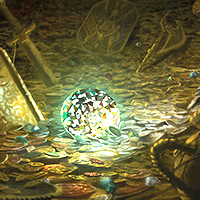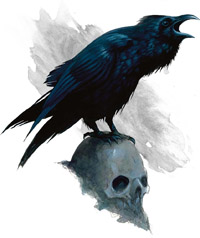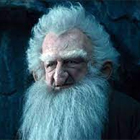The text below is from the [ original novel ].
- Which parts of the video are the same as the novel?
- Which parts of the video are different from the novel?
- Which parts of the novel are not in the video?
But there was still a company of archers that held their ground among the burning houses. Their captain was Bard, grim-voiced and grim-faced, whose friends had accused him of prophesying floods and poisoned fish, though they knew his worth and courage. He was a descendant in long line of Girion, Lord of Dale, whose wife and child had escaped down the Running River from the ruin long ago. Now he shot with a great yew bow, till all his arrows but one were spent. The flames were near him. His companions were leaving him. He bent his bow for the last time.
Suddenly out of the dark something fluttered to his shoulder. He started—but it was only an old thrush. Unafraid it perched by his ear and it brought him news. Marvelling he found he could understand its tongue, for he was of the race of Dale.
“Wait! Wait!” it said to him. “The moon is rising. Look for the hollow of the left breast as he flies and turns above you!” And while Bard paused in wonder it told him of tidings up in the Mountain and of all that it had heard.
Then Bard drew his bow-string to his ear. The dragon was circling back, flying low, and as he came the moon rose above the eastern shore and silvered his great wings.
“Arrow!” said the bowman. “Black arrow! I have saved you to the last. You have never failed me and always I have recovered you. I had you from my father and he from of old. If ever you came from the forges of the true king under the Mountain, go now and speed well!”
The dragon swooped once more lower than ever, and as he turned and dived down his belly glittered white with sparkling fires of gems in the moon—but not in one place. The great bow twanged. The black arrow sped straight from the string, straight for the hollow by the left breast where the foreleg was flung wide. In it smote and vanished, barb, shaft and feather, so fierce was its flight. With a shriek that deafened men, felled trees and split stone, Smaug shot spouting into the air, turned over and crashed down from on high in ruin.
Full on the town he fell. His last throes splintered it to sparks and gledes. The lake roared in. A vast steam leaped up, white in the sudden dark under the moon. There was a hiss, a gushing whirl, and then silence. And that was the end of Smaug, but not of Bard.
Now we will return to Bilbo and the dwarves. All night one of them had watched, but when morning came they had not heard or seen any sign of danger. But ever more thickly the birds were gathering. Their companies came flying from the South; and the crows that still lived about the Mountain were wheeling and crying unceasingly above.
“Something strange is happening,” said Thorin. “The time has gone for the autumn wanderings; and these are birds that dwell always in the land; there are starlings and flocks of finches; and far off there are many carrion birds as if a battle were afoot!” Suddenly Bilbo pointed: “There is that old thrush again!” he cried. “He seems to have escaped, when Smaug smashed the mountain-side, but I don’t suppose the snails have!”
Sure enough the old thrush was there, and as Bilbo pointed, he flew towards them and perched on a stone nearby. Then he fluttered his wings and sang; then he cocked his head on one side, as if to listen; and again he sang, and again he listened.
“I believe he is trying to tell us something,” said Balin; “but I cannot follow the speech of such birds, it is very quick and difficult. Can you make it out Baggins?”
“Not very well,” said Bilbo (as a matter of fact, he could make nothing of it at all); “but the old fellow seems very excited.”
“I only wish he was a raven!” said Balin.
“I thought you did not like them! You seemed very shy of them, when we came this way before.”
“Those were crows! And nasty suspicious-looking creatures at that, and rude as well. You must have heard the ugly names they were calling after us. But the ravens are different. There used to be great friendship between them and the people of Thror; and they often brought us secret news, and were rewarded with such bright things as they coveted to hide in their dwellings.
“They live many a year, and their memories are long, and they hand on their wisdom to their children. I knew many among the ravens of the rocks when I was a dwarf-lad. This very height was once named Ravenhill, because there was a wise and famous pair, old Carc and his wife, that lived here above the guard- chamber. But I don’t suppose that any of that ancient breed linger here now.”
No sooner had he finished speaking than the old thrush gave a loud call, and immediately flew away.
“We may not understand him, but that old bird understands us, I am sure,” said Balin. “Keep watch now, and see what happens!”
Before long there was a fluttering of wings, and back came the thrush; and with him came a most decrepit old bird. He was getting blind, he could hardly fly, and the top of his head was bald. He was an aged raven of great size. He alighted stiffly on the ground before them, slowly flapped his wings, and bobbed towards Thorin.
“O Thorin son of Thrain, and Balin son of Fundin,” he croaked (and Bilbo could understand what he said, for he used ordinary language and not bird- speech). “I am Roäc son of Carc. Carc is dead, but he was well known to you once. It is a hundred years and three and fifty since I came out of the egg, but I do not forget what my father told me. Now I am the chief of the great ravens of the Mountain. We are few, but we remember still the king that was of old. Most of my people are abroad, for there are great tidings in the South—some are tidings of joy to you, and some you will not think so good.
“Behold! the birds are gathering back again to the Mountain and to Dale from South and East and West, for word has gone out that Smaug is dead!”
“Dead! Dead?” shouted the dwarves. “Dead! Then we have been in needless fear—and the treasure is ours!” They all sprang up and began to caper about for joy.
Now the days passed slowly and wearily. Many of the dwarves spent their time piling and ordering the treasure; and now Thorin spoke of the Arkenstone of Thrain, and bade them eagerly to look for it in every corner.
“For the Arkenstone of my father,” he said, “is worth more than a river of gold in itself, and to me it is beyond price. That stone of all the treasure I name unto myself, and I will be avenged on anyone who finds it and withholds it.”
Bilbo heard these words and he grew afraid, wondering what would happen, if the stone was found—wrapped in an old bundle of tattered oddments that he used as a pillow. All the same he did not speak of it, for as the weariness of the days grew heavier, the beginnings of a plan had come into his little head.
[ printable .pdf ]
 English
English Português
Português Español
Español 한국어
한국어






